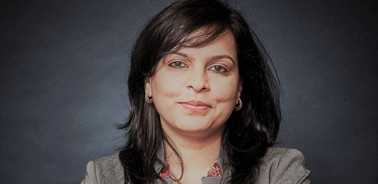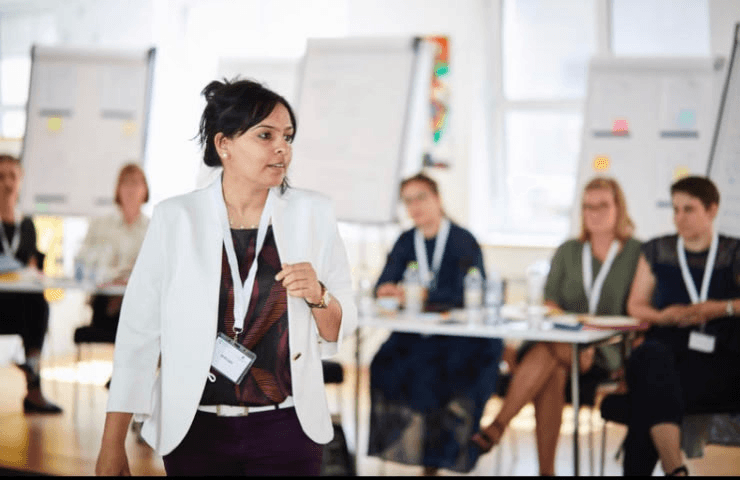- Home
- News And Events
- What’s Going On
- Faculty Spotlight: Kriti Jain
Faculty Spotlight: Kriti Jain

Meet one of IE Business School’s most influential thought leaders.
Recently named to Poet & Quants’ Best 40 Under 40 Business School Professors of 2022 list, Kriti Jain is one of IE Business School’s most popular professors and the recipient of several prestigious grants from the European Union, United States, and Spanish government for her research on decision-making.
She is a leading management expert and works with global business leaders and policy makers on topics of leadership, decision-making, and organizational culture. Dubbed as the Oscars of Management Thinking, Thinkers50 has recognized her as a global thinker with the potential to change the world of theory and practice.
Prof. Jain is a champion of diversity and inclusion especially in emerging markets and has developed training programs on women leadership and entrepreneurship including in collaboration with United Nations. Her Indian background, combined with work experiences in US & Europe, provides her with a multi-dimensional lens to issues of business, education, and society. She is on the advisory board of several businesses and universities, is a public speaker, and a regular media commentator.
Her research work has been published in leading science and management journals including, Management Science, Harvard Business Review, Human Resource Management, Journal of Behavioral Ethics, and Journal of Operations Management.
Meet one of IE Business School’s top researchers.
What brought you to IE? Where were you before? And what keeps you here?
IE was pure serendipity. I was in Singapore before this doing my PhD at INSEAD. Even though I had worked in Europe while I was at McKinsey, I had never been to Spain except for a retreat. When I was graduating from INSEAD, I knew I wanted to live in Europe or Asia. IE was recruiting research faculty at that time, the school invited me to Madrid for a research seminar, and the rest is history. I love the warmth, the collegiality, and the overall zest for life.
Have you ever had an a-ha moment while teaching that furthered your research? What was it?
I do a lot of research on leadership and the future of work. As a professor, I am in a unique position to get pulse-checks from different stakeholders in the society. For example, one thing I hear from Gen Z a lot is that flexibility is an important need for them. Employers want to provide it too. But during recent discussions, I realized that ‘flexibility’ means different things for the two sides. Employees want flexibility to work ‘from anywhere and anytime of their choice’ while employers have been implicitly behaving as if flexibility means working ‘all the time’ and the expectation that employees be available 24X7. Paradoxes such as these create toxic work cultures. Related, we are working with advocacy groups on new government-level policy changes to safeguard employees’ rights in this new world of work. So, all in all, classroom conversations are a wonderful source of insights into the changing needs and expectations that people have from businesses. And I often bring these into my research and consulting to find solutions to humanize work.
What book do you wish your students would read before taking your class and why?
First one would be Atomic Habits. The book allows readers to start having a conversation and exploration about our seemingly-small behaviors that can have significant influence towards growth and transformation. Especially in a fatigued world, knowing how to develop new routines is crucial for well-being and productivity. Second, I highly recommend reading When Breath becomes Air – it is a memoir of a young ambitious neurosurgeon who was suddenly diagnosed with terminal cancer. A profound exploration of life, fragility, and mortality. My hope is that by reading something so philosophical, students can embrace the humaneness we all have inside of us while being trained for an ultra-competitive business world.
Please name one of your articles you feel addresses the most important issues in 2022 for IE alumni?
I enjoy doing research around mindsets and emotions and their implications for workplace behaviors, productivity, and happiness. In one research, also featured in an HBR article, I studied the effect of competition on ethics. We often face fierce competition where there are only few winning slots — and maybe just one — with massive stakes in terms of money, advancement, and fame. The research looks at how these competitive situations can blind us towards ethical considerations.
Whose research of your IE colleagues do you find interesting? Why?
Our faculty colleagues do very interesting work! I particularly enjoy Jeeva Somasundaram’s research work with important behavioural policy implications. For example, in one project with the Singapore government, he has been working on how to create new citizen behaviors related to air-conditioning usage that is climate-sensitive and sustainable. Also, his other work with another colleague, Laura Zimmermann, on nudges to reduce digital addiction is fascinating.
What does Business with Purpose mean to you and how does it apply to your own work?
To me, the first fundamental point to remember is that businesses are about people. In the workplace, this implies the need to humanize work. To remember that employees have their own emotions, struggles, backstories, and needs. Somehow, we focus a lot on customer-centricity and forget the basic tenets of employee-centricity - Happy employees lead to happy customers. This simple equation is often lost. So, in my teaching and research, I focus quite a bit on compassionate management and emotional intelligence.
Second, I strongly believe that we humans are only one very small aspect of this planet. And if we can keep an awareness that our very existence is intertwined with the rest of the planet and the cosmos, then everyday actions and decisions are more likely to be sustainable and responsible. Cultivating that consciousness within all our communities is one of my missions.
Tell us one personal thing about yourself that none of your students know. A hobby, sport or talent? Strange fact? Unusual interest?
I am a trained yoga practitioner. The sounds of birds and the smell of first rain are my best joys.
